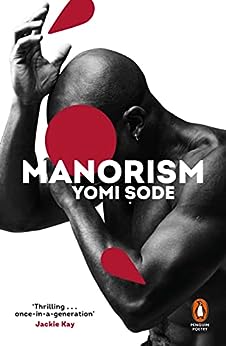If the measure of a work of art or literature is the level of insight the reader gains into the artist’s world, then ‘Manorism’ succeeds supremely well. It does this because of the inventive use of language and the ability to show us the world of the writer.

In this first collection by Yomi Sode, a British Nigerian poet and performer, we step into Yomi’s world – a diaspora of people and places, family and friends, which stretches from Nigeria to Brixton and Dalston in London, UK. Yomi reveals this world sometimes through a style of writing which is close to a stream-of-consciousness. But rather than drifting off into a netherworld, he knows when to skilfully shift gear and to land us right back into the reality of young black men in England in the 21st Century.
This reality is often harsh and discriminatory. We learn about the corrosive prejudice against a young black man of being asked to pay for a meal at the moment of ordering it while at the same time, a couple in the same restaurant are excused this indignity. But rather than railing angrily, Yomi asserts himself and his kinship to have the right to speak and live according to their cultures and traditions.
Often the collection focuses on specific people in the family. There is a love letter to his son, the sad end of Big Mummy and the rituals for the embalming of Okonkwo. This book is rooted in the time of its writing. We come across celebrities both popular (Stormzy, Tinie Tempah), the redeemed (Ant McPartlin) and the unpopular (David Starkey, Laurence Fox). There are politicians, Diane Abbott and Dominic Raab (who? he?).
The focus of the speaker encompasses not only major issues but zooms in on the small events of the everyday. So we see the speaker at work cooking a meal, preparing okra and mackerel. But then the focus shifts and we are seeing Caravaggio and his dispute with a waiter in another time over a plate of artichokes. Caravaggio appears throughout the text as a symbol of the outsider who had to fight his corner to survive and to succeed as an artist.
These experiences and perceptions are portrayed through a wide range of linguistic devices – poems, vignettes, prose, idiomatic use of English (e.g. often dropping the th from the so the definite article is reduced to e). There are phrases and sentences which are presented in a language of Nigeria. Because of the ambition and originality of this collection, I would suggest readers read it at least three or four times so as to tune into this remarkable portrayal. This first collection is impressive while being direct and speaking to a strongly lived experience.
